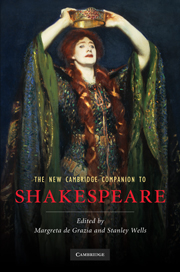Book contents
- Frontmatter
- 1 The traces of Shakespeare’s life
- 2 Shakespeare’s reading
- 3 Shakespeare’s writing: from manuscript to print
- 4 The theatre of Shakespeare’s London
- 5 The transmission of Shakespeare’s texts
- 6 Shakespeare and language
- 7 Shakespeare the poet
- 8 Shakespeare’s comedies
- 9 Shakespeare’s tragedies
- 10 Shakespeare’s English history plays
- 11 Shakespeare’s classical plays
- 12 Shakespeare’s tragicomedies
- 13 Shakespeare, religion and politics
- 14 Shakespeare and race
- 15 Shakespeare, sexuality and gender
- 16 Shakespeare on the stage
- 17 The critical reception of Shakespeare
- 18 Shakespeare and popular culture
- 19 Shakespeare and globalization
- 20 Shakespeare and media history
- 21 Shakespeare: reading on
- Index
19 - Shakespeare and globalization
Published online by Cambridge University Press: 28 January 2011
- Frontmatter
- 1 The traces of Shakespeare’s life
- 2 Shakespeare’s reading
- 3 Shakespeare’s writing: from manuscript to print
- 4 The theatre of Shakespeare’s London
- 5 The transmission of Shakespeare’s texts
- 6 Shakespeare and language
- 7 Shakespeare the poet
- 8 Shakespeare’s comedies
- 9 Shakespeare’s tragedies
- 10 Shakespeare’s English history plays
- 11 Shakespeare’s classical plays
- 12 Shakespeare’s tragicomedies
- 13 Shakespeare, religion and politics
- 14 Shakespeare and race
- 15 Shakespeare, sexuality and gender
- 16 Shakespeare on the stage
- 17 The critical reception of Shakespeare
- 18 Shakespeare and popular culture
- 19 Shakespeare and globalization
- 20 Shakespeare and media history
- 21 Shakespeare: reading on
- Index
Summary
The worldwide diffusion of William Shakespeare's works occurs today, as it has occurred for centuries, in the context of social processes of mobility and mediation. Since the 1960s these processes have been studied under the rubric 'globalization', but the term names a condition as ancient as the experience of empire and diaspora, of nations and the states they create. Such antiquity should not lead us, however, to equate classical Rome with Elizabethan England or modern Russia or Japan. On the contrary, if we can accept an influential definition of globalization as both 'the compression of the world and the intensification of consciousness of the world as a whole', then we should try to historicize that compression and that consciousness. We might begin with Shakespeare himself, since he lived in the age when all the world's populated continents were first permanently linked by trade. Some economic historians have even argued that globalization began in the year 1571, when the Spanish established Manila as an entrepôt finally connecting Asia and the Americas, and William Shakespeare of Stratford-upon-Avon turned 7. During his lifetime, cultural exchanges multiplied not only among European nations, but between Europe and the Atlantic and, more slowly, Pacific worlds. Many of these growing interdependencies left their mark on Shakespeare's writing and theatre, from advances in stage design to an explosion of literary sources in print.
- Type
- Chapter
- Information
- The New Cambridge Companion to Shakespeare , pp. 285 - 302Publisher: Cambridge University PressPrint publication year: 2010
- 11
- Cited by

